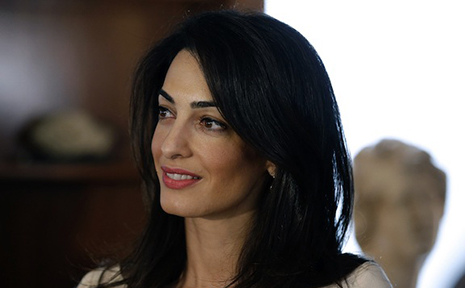Amal Clooney to Represent Armenia in European Court

Here is a surprising news item being disclosed for the first time in this column—Amal Ramzi Alamuddin, wife of prominent actor and human rights activist George Clooney, will be one of the attorneys representing Armenia next month at the European Court of Human Rights (ECHR).
Mrs. Clooney has been involved in several major lawsuits such as return of the Elgin Marbles from Great Britain to Greece, and defending Julian Assange of WikiLeaks and former Ukrainian Prime Minister Yulia Tymoshenko. She has also worked with the Prosecutor of the UN Special Tribunal for Lebanon, and the International Criminal Tribunal for former Yugoslavia.
She served as advisor to Kofi Annan, UN Special Envoy on Syria, and as Counsel to the 2013 UN Drone Inquiry team. She is fluent in English, French and Arabic. Her marriage to George Clooney in September 2014 made worldwide headlines.
Taking into consideration her credentials, Armenia intends to advertise itself by choosing Amal Clooney as an attorney. At the same time, Yerevan knows well that it will lose the case.
The case involves the conviction by Swiss courts of Dogu Perincek, a Turkish political party leader, who had travelled to Switzerland in 2005 with the intent of denying the so-called Armenian Genocide. In 2008, Perincek appealed the Swiss ruling to the European Court of Human Rights. A majority of five out of seven ECHR judges ruled on Dec. 17, 2013 that Switzerland had violated Perincek’s right to free expression.
The court considered denial of the Armenian Genocide infringement on free speech.
On March 17, 2014, Switzerland decided to appeal the ruling to ECHR’s 17-judge Grand Chamber, to defend the integrity of its laws and the country’s legal system. Specifically, the Swiss government challenged the court’s decision on three grounds:
1) ECHR had never before dealt with the juridical qualification of genocide and the scope of freedom of expression;
2) The undue restriction of “the margin of appreciation” available to Switzerland under ECHR’s jurisprudence;
3) The establishment of ‘artificial distinctions’ — in the absence of an international verdict, ECHR should have considered the Turkish Court’s 1919 guilty verdicts against the masterminds of the Armenian Genocide as evidence related to World Court’s jurisprudence.
Last year, when ECHR’s lower court was considering Perincek’s case, Armenia did not participate.
This time the hearing for the Perinçek v. Switzerland case, in front of the Grand Chamber of the European Court of Human Rights (ECHR), will take place in January 2015, and so will coincide with the centennial of the 1915 events. After the decision of the French Constitutional Council in February 2012, finding the Boyer bill in contradiction with the Declaration of Human Rights (1789), the ruling of the ECHR was a major blow for Armenian nationalism. The Court found a violation of Doğu Perinçek’s freedom of speech, and rejected the accusation of “racism.” The ECHR “shares the opinion of the Turkish government, who claims Holocaust denial is the main driving force of anti-Semitism today. In fact, it judges that this is still a current phenomenon, which the international community must be firm and vigilant against. One cannot affirm that the dismissal of the description of ‘genocide’ for the tragic events that occurred in 1915 and the following years might have the same repercussions.” The Court added, even more remarkably, that “the present case is clearly distinct from cases bearing on the denial of Holocaust crimes,” because the Holocaust deniers “had not only contested the simple legal description of a crime, but also denied historic facts,” and because these facts “had been judged to be clearly established by an international jurisdiction,” with “a clear legal basis, i.e. Article 6, paragraph C), of the Statutes of the International Military Tribunal in Nuremberg.”
This distinction is crucial and, indeed, well substantiated. For the Armenian case, the only attempt of an international tribunal, by the British government in Malta, totally failed. More than two years of investigation (1919-1921) were not sufficient to find any evidence against any of the 144 Ottoman ex-leaders interned in Malta; the seized Ottoman documents explicitly warned against measures susceptible to lead to massacres and ordered the protection of the relocated Armenians. If any evidence of “genocide” had existed, it would have been found by the British. These Ottoman documents seized by the British army and published more than 35 years ago by Salâhi Sonyel include:
“Armenian Deportations: A Reappraisal in the Light of New Documents,” Belleten, January 1972 and “The Displacement of Armenians: Documents, Ankara, 1978.” Nobody has ever been able to find a satisfactory explanation to conciliate the “genocide” charge with these orders.
“Furthermore, the Court considers, with the applicant, that ‘genocide’ is a well-defined legal concept … It is thus a very strict legal concept, which is, moreover, difficult to prove. The Court is not convinced that the ‘general consensus’ to which the Swiss courts have referred, to justify the conviction of the applicant, can bear on these very specific points of law.” In other terms, the ECHR noticed an obvious but fundamental fact: There is no consensus on the “Armenian genocide” charge. Indeed, since its emergence in the public debate, in 1965, these accusations have been challenged, with documentation, by respectable historians such as Edward J. Erickson, Bernard Lewis, Guenter Lewy, Stanford Jay Shaw and Gilles Veinstein.
The ECHR’s ruling is an unprecedented demolition of the core of the Armenian nationalist claims. Not surprisingly, there was huge pressure on the Swiss government, who violated its tradition of neutrality and accepted filing a poorly substantiated application to the Grand Chamber. Currently, there are unbelievable pressures on the Grand Chamber itself, both from Armenia and from the diaspora.
Sabina Hasanova














































